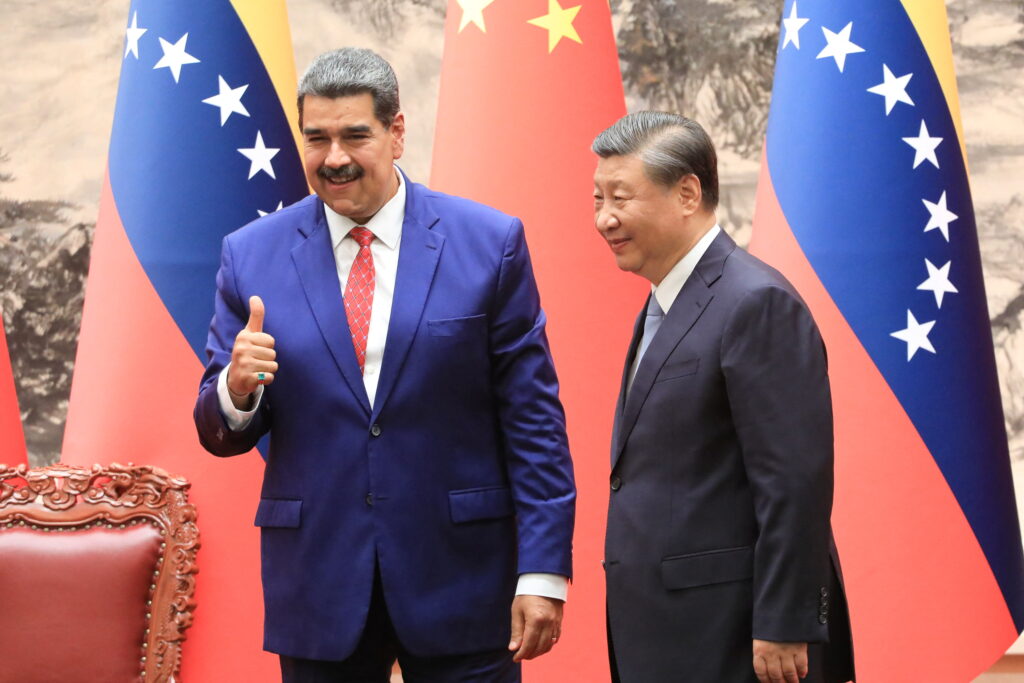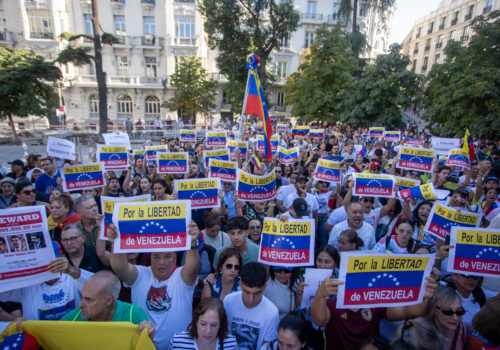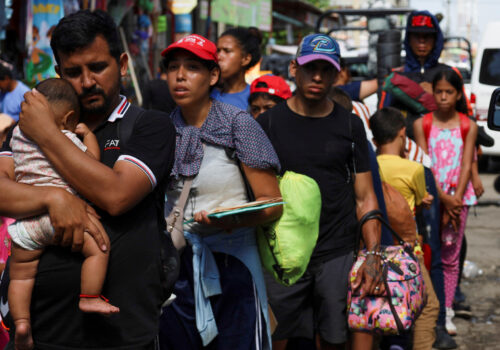Core to China’s charm offensive in Latin America is a narrative of “noninterference.” China presents its model of “South-South” diplomacy as an alternative to western hegemony, one supposedly predicated on a principled opposition to meddling in other countries’ internal affairs. China’s actions in Latin America have never matched this rhetoric, and the July presidential election in Venezuela—after which Beijing put its finger firmly on the scale to boost Maduro—demonstrates just how far Beijing is willing to go to shape Latin America to its liking.
Within minutes of a disputed declaration of Nicolás Maduro’s victory—which “could not be verified or corroborated” by the only independent, international observers there and spurred brutal crackdowns on protesters—Chinese Foreign Ministry spokesperson Lin Jian, in a press briefing, congratulated Venezuela on its “smooth presidential election” and Maduro for his “successful reelection.” As calls rose for transparency and recognition of the Venezuelan voters’ will—nine Latin American nations, among others, called for a review of the vote—Lin doubled down: “I made clear China’s position yesterday. The Venezuelan people’s choice should be respected.” That same day, Chinese leader Xi Jinping declared that Beijing will “firmly support Venezuela’s efforts to safeguard national sovereignty, national dignity, and social stability.”
In August, I participated in the American Foreign Policy Council’s annual delegation to China and had the opportunity to voice my frustrations over Beijing’s support for Maduro directly with Chinese decision makers. Senior leaders at both the Ministry of Foreign Affairs and the China Institutes of Contemporary International Relations (a Ministry of State Security-affiliated think tank) gave similar responses. They told me that China does not interfere in the affairs of other countries and that there are claims of election interference across the world, including in the United States’ most recent presidential election. In these cases, in which one party contests the vote, one official asked me, what would you have us do?
Nothing, actually. If China truly was the neutral, nonjudgmental partner that it claimed to be, Beijing could have chosen inaction, gotten out of the way, and allowed the will of the people to run its course. It also could have sided with the preponderance of evidence suggesting fraud—as dozens of other nations have. But by issuing these statements of support for Maduro, and speaking out so quickly, China decisively put its finger on the scale to help prop up a fellow autocracy, upending the will of a democratic movement.
Life support for Maduro
China’s longstanding support for the undemocratic regime in Venezuela is financial and material as well as diplomatic. In the 2000s, Beijing gave President Hugo Chávez tens of billions of dollars in investments and loans-for-oil deals. Maduro, Chávez’s hand-picked successor, took office after Chávez’s death in 2013, and since then, China has provided critical life support to his increasingly oppressive regime in the form of loans, cash, and investments.
Beijing’s support has at times included acting in accordance with Maduro’s interests during elections. In January 2019, when opposition leader Juan Guaidó declared himself acting president, over fifty governments officially recognized his election. China stayed silent. That silence benefited Maduro, but Beijing cited noninterference as the reason for their inaction. In December 2020, Venezuela’s major opposition parties boycotted parliamentary elections, which they described as fraudulent and failing to meet the minimum requirements to qualify as free, fair, and transparent. Those elections were rejected by more than fifty-five countries, including the United States, members of the European Union (EU) and the EU-led International Contact Group, the Organization of American States, and the multilateral Lima Group. China, Russia, and Cuba were the only countries that recognized the 2020 parliamentary elections as legitimate. In January 2023, when the Maduro regime attempted to block a legitimate vote for National Assembly president, Beijing again remained silent.
Concrete proof of Maduro’s loss
The Venezuelan democratic movement pulled off a massive achievement in gathering clear evidence of electoral fraud in the presidential elections in July. In the weeks leading up to the election, roughly five thousand workshops were held for tens of thousands of volunteers, although some estimates place the size of the group closer to one million (out of Venezuela’s population of 28.3 million people). Volunteers were trained on electoral laws, including their right, as volunteer observers representing political parties, to obtain copies of their polling location’s voting tally. When election day came, volunteers faced significant hostility from soldiers, police, and Chavista loyalists guarding the polling stations. And yet, a mass democratic movement, operating in one of the world’s most oppressive regimes, succeeded. In an impressive logistical feat, volunteers gathered 83 percent of the voting tallies across the country, and, within forty-eight hours, digitized them and uploaded the results to a public website. The result was concrete proof that the opposition candidate, Edmundo González, had won 67 percent of the vote, compared to Maduro’s 30 percent.
The tallies have since been verified by five independent analyses: the Associated Press; the Washington Post; Colombian nongovernmental group Misión de Observación Electoral; Walter R. Mebane Jr., University of Michigan professor of election forensics; and the New York Times, whose analysis of partial voting tallies both broadly replicated the opposition’s estimates of the results within two percentage points and ruled out the possibility of a Maduro victory by any margin
Maduro nonetheless declared victory, backed by Venezuela’s National Electoral Council, which announced that he had secured 51 percent of the votes, compared to 44 percent for González. As the opposition party revealed that it had evidence to prove that its candidate had won, most of the international community came to a similar conclusion about the fraudulence of the official tally. The Carter Center, which was invited to observe the election, issued a statement that the vote “did not meet international standards of electoral integrity,” and that the outcome “cannot be considered democratic.” In the following twenty-four hours, the United States, EU, United Kingdom, Italy, Spain, Brazil, Peru, Chile, and the United Nations all cast doubt on the legitimacy of the election results.
Out of step with Latin America
China—Maduro’s longtime friend—stood apart from the crowd. One big question now is, to what degree will Beijing’s support for Maduro constitute a reputational hazard for China in Latin America and beyond?
China is now firmly out of step with most nations in a region where Xi hopes to deepen relations. All of Latin America, aside from Bolivia, Nicaragua, Honduras, and Cuba, has either rejected Maduro’s reelection claim or expressed concern over the official election results. Mexico, which famously avoids entanglement in foreign controversies, has asked to see the National Electoral Council’s voting records. Even those who are not concerned with the humanitarian crisis in Venezuela will surely resent the resulting massive influx of migration putting a strain on the economies of Venezuela’s neighbors. On this matter, China is also at odds with several of its BRICS partners, both in the region (Brazil) and beyond (India and South Africa).
The extent to which this incident will factor into decision making in Latin American countries vis-à-vis China remains to be seen. As observers, we can only hope that citizens across the region are taking note of what seems to be a clear lesson from the China-Venezuela relationship: If you are looking for a partner who will allow you to shape the future of your own country, look elsewhere.
Caroline Costello is a program assistant with the Atlantic Council’s Global China Hub.
Further reading
Wed, Sep 18, 2024
To prevent further destabilization in Venezuela, regional leaders must trade chaos for coordination
New Atlanticist By Lucie Kneip
To help move Venezuela toward a transition of power and greater stability, democratic countries must align their policies toward Caracas.
Tue, Aug 20, 2024
Amid rising insecurity in Venezuela, the US and its partners must prepare for a new wave of migration
New Atlanticist By Lucie Kneip
With the Maduro regime cracking down after a fraudulent presidential election, many Venezuelans who held out hope for political change are preparing to leave their country.
Mon, Feb 12, 2024
China pairs actions with messaging in Latin America. The United States should do the same.
Atlantic Council Strategy Paper Series By David O. Shullman
China has coordinated trade, financing, and investment with diplomatic engagement, public diplomacy, and information operations to deepen its influence in Latin America and the Caribbean. Washington should, in turn, pair diplomatic engagement and messaging with greater attention to regional countries’ needs.
Image: China's President Xi Jinping and Venezuela's President Nicolas Maduro meet at the Great Hall of the People in Beijing, China , onSeptember 13, 2023. Miraflores Palace/Handout via Reuters.



